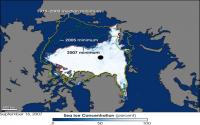Recent News

Sen. Mark Begich argues that ratification of UNCLOS is in Alaska's interests and that "[f]ailure to act with the fast-changing Arctic could leave billions of dollars and thousands of jobs on the table."
[ More ]
Doug Bandow of the Cato Institute warns of the dangers of litigation if the United States joins the U.N. Convention on the Law of the Sea, more commonly known as the Law of the Sea Treaty (LOST).
[ More ]
In the past 12 months, the geopolitics of rare earths has become evident. REMs are becoming a strategic resource over which the two emerging giants are competing in Asia. Indeed, one might say rare earths are fast becoming “the next oil.”
[ More ]
With Sen. John Kerry tapped to be the next secretary of state, continuity is likely for most policies. This includes pressing for ratification of the Law of the Sea Treaty (LOST). It’s a bad idea, as the International Tribunal on the Law of the Sea has helpfully reminded Americans.
[ More ]
Americans participating in the Great Decisions annual National Opinion Ballot express strong support for UNCLOS and fisheries managment.
[ More ]
When a nation joins the United Nations Convention on the Law of the Sea (UNCLOS) it should be prepared to have its domestic court rulings overturned by an international tribunal. That hard lesson was recently learned by Ghana.
[ More ]
Craig H. Allen argues that the recent ITLOS decision against Ghana "should receive a warm welcome in the Pentagon—[as it] sends a clear message on the principle of sovereign immunity of warships and the readiness of ITLOS to enforce that immunity even when the warship is in the port or internal waters of another state—at least if the involved states are party to the 1982 LOS Convention.
[ More ]
Now that China has acquired and entered into service its first aircraft carrier, speculation about the extent of its naval ambitions is likely to increase. Some analysts have linked China's maritime profile with its growing economic and military power: as the country rises in international stature, so too will its overseas interests expand, and its military capabilities will follow suit.
[ More ]
A new international study—done by 47 experts using data from multiple satellites and aircraft—shows that the Earth is losing ice at an ever-increasing rate from both poles. We’ve known for years that the Arctic has been suffering massive ice loss, with the record low broken more than once in recent years. What’s devastating about this new report is that it shows unequivocally and quantitatively that the Antarctic is also losing land ice, with the critical West Antarctica ice sheet losing on average 65 billion tons of ice every year.
[ More ]
Expect more water to lap at your shores. That's the take-home message from two studies out this week that look at the latest data on sea level rise due to climate change. The first shows that current projections for the end of the century may seriously underestimate the rise in global sea levels. The other, on the ice sheets of Greenland and Antarctica, looks at just how much of the water stored up there has been moving into the oceans.
[ More ]